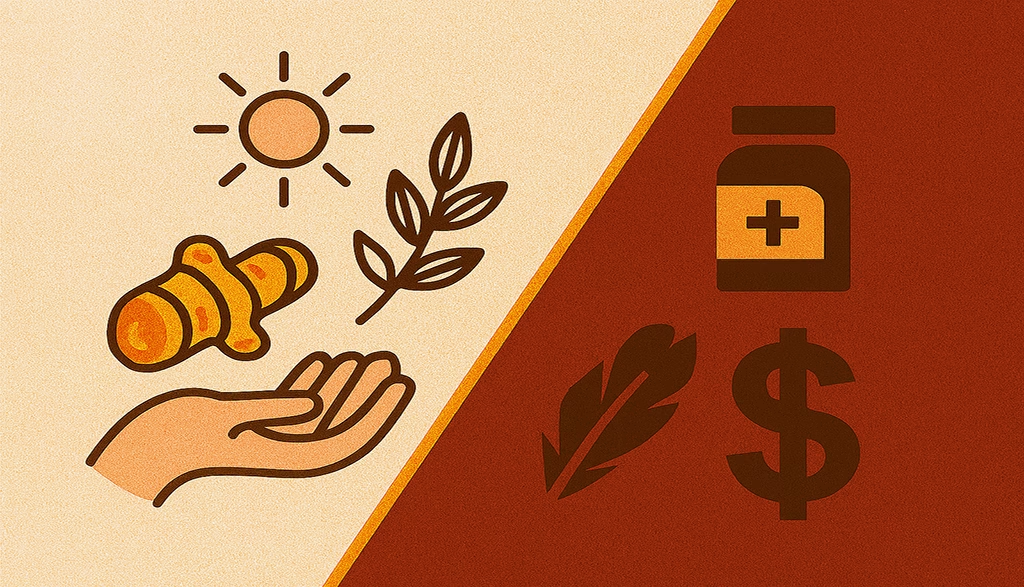Reading Time: 3 minutes
Content
Commerce, Tradition, and the Untapped Power of Nature
This question delves into the core of both commerce and tradition, highlighting the debate of natural remedies commerce vs tradition. While natural remedies sustained civilizations for centuries, they are frequently overshadowed by the modern medical industry. Despite their demonstrated benefits, plant-based solutions continue to occupy a peripheral role in mainstream healthcare. To comprehend this disparity, one must examine the interplay of economics, regulatory frameworks, scientific validation, and philosophical perspectives. This reflects the ongoing debate of natural remedies commerce vs tradition.
Patents and Profit Motives
The pharmaceutical industry relies heavily on exclusivity to sustain its business model. Natural compounds, such as curcumin derived from turmeric or quercetin found in fruits, cannot be patented in their unaltered forms since they are naturally occurring substances. Without the protection of patents, companies lose the ability to monopolize a product, significantly diminishing potential revenue streams.
As a result, pharmaceutical companies frequently opt to isolate specific molecules or develop synthetic analogs that can be patented and sold at premium prices. This approach not only guarantees substantial financial returns but also facilitates robust branding and regulatory oversight. Consequently, natural remedies commerce vs tradition becomes a focal point, as natural alternatives are often marginalized, even when they provide comparable or superior benefits.
Regulatory Barriers and Costly Trials
Moreover, even if a plant has been used safely for centuries, it must still undergo extensive clinical trials to gain approval as a drug. These trials are not only costly but also highly time-consuming. Because the natural form of the plant cannot be patented, companies are often less motivated to invest in its validation.
As a result, numerous promising natural remedies remain insufficiently researched or confined to the supplement aisle, where regulatory standards are less stringent and scientific credibility is frequently scrutinized. This perpetuates a cycle in which the absence of research fosters distrust, and that distrust, in turn, limits broader adoption, intensifying the discussion of natural remedies commerce vs tradition.
Standardization Challenges
Moreover, plants possess an inherent complexity. A single herb may contain numerous active compounds, with potency influenced by factors such as soil quality, climate, harvesting methods, and storage conditions. This variability complicates the standardization of dosages and the achievement of consistent therapeutic outcomes.
In contrast, synthetic drugs are designed for precision, comprising isolated compounds with predictable effects, thereby facilitating regulation, manufacturing, and clinical testing. Consequently, the medical industry prioritizes consistency over complexity, even when that complexity embodies the wisdom of nature, further fueling the natural remedies commerce vs tradition debate.
Safety Concerns and Misconceptions
While many natural remedies are generally considered safe, some can have severe side effects or negatively interact with medications. For instance, kava has been associated with liver damage, while ephedra was banned due to its cardiovascular risks. Such instances have heightened skepticism and caution among regulators and healthcare practitioners.
Furthermore, the term “natural” is often misinterpreted. All substances, including plants, consist of chemicals. The belief that natural equates to safety is misleading and has contributed to both overuse and insufficient regulation. Consequently, the medical industry tends to err on the side of caution, prioritizing controlled substances over the complexities of botanical remedies.
Philosophical Divide: Holistic vs. Targeted
Beyond economics and regulation, a deeper philosophical divide exists. Natural medicine operates holistically, addressing the body’s systems as a whole rather than focusing on a single symptom. It prioritizes balance, prevention, and sustained vitality over time.
In contrast, pharmaceutical drugs are designed for precision, offering rapid relief, targeted action, and measurable outcomes. This fundamental difference in perspective influences how each approach is studied, marketed, and prescribed. As a result, holistic remedies are frequently dismissed as anecdotal or lacking scientific rigor, despite their often-profound effects.
Natural plants commerce vs tradition
In certain countries, people often turn to natural plants, which have been used for centuries, as a primary approach to treatment. If these remedies prove ineffective, they then consider chemical-based medications. Doctors in these regions frequently suggest natural remedies as an alternative option to their patients. In such places, medicine is regarded not as a business but as a devoted and passionate profession.
So, What’s the Future?
Despite these barriers, interest in plant-based medicine is growing. Researchers are now exploring the molecular diversity of natural compounds for new drug development. At the same time, consumers—like you—are increasingly seeking holistic, ethical, and sustainable options. Therefore, the tide may be turning. Slowly but surely, the medical industry is beginning to recognize that nature holds untapped potential—not just for healing, but for prevention, empowerment, and cultural renewal.




